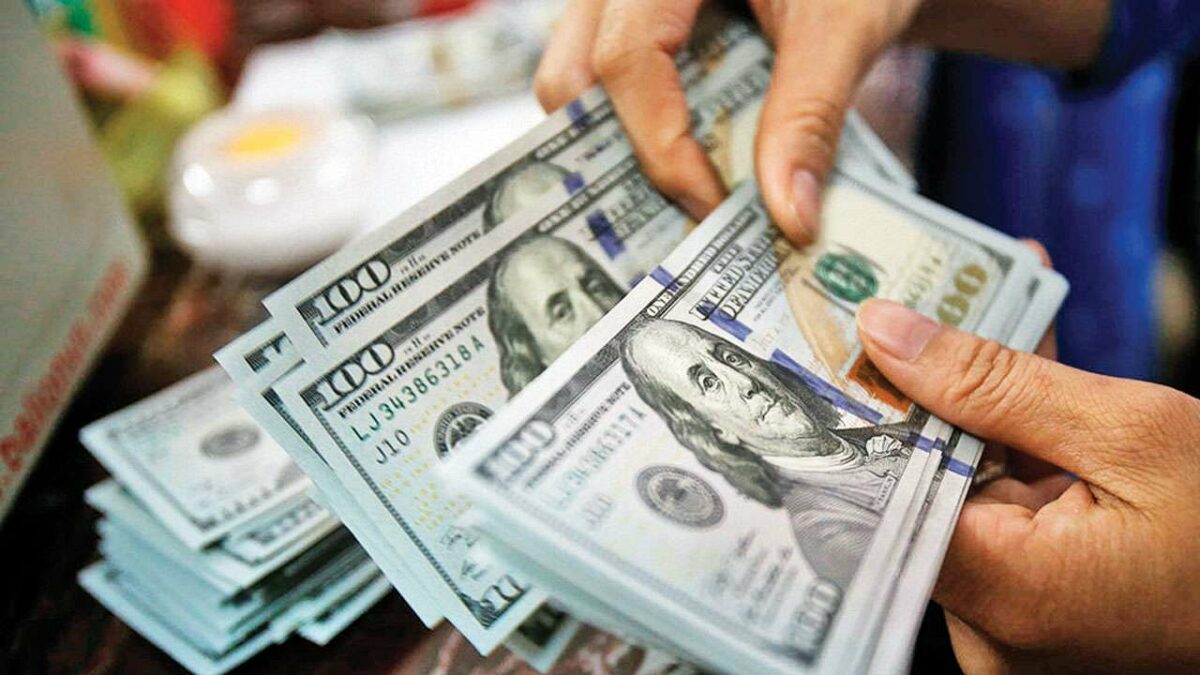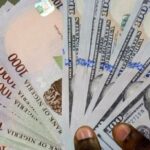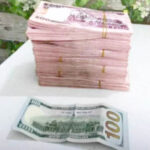Business owners are facing tougher times with the crash of the naira at the parallel market, as local entrepreneurs find it difficult to raise funds especially the US dollar to transact businesses across the world.
Daily Trust reports that the major foreign exchange (forex) currencies like the United State Dollar, Euro and the Pound Sterling have skyrocketed.
- World AIDS Day: ‘People Rather Sit With COVID-19 Patients Than An HIV Positive Person’
- Terrorism May Persist For Another 20 Years In Nigeria – Buratai
The pound is about N506, a dollar is N380 and Euro is N453 at the Central Bank of Nigeria (CBN) official exchange rate.
However, getting access to foreign currencies from commercial banks entail huge drama, loss of time and most times deliberate denials to access the forex, a situation that frustrates business owners and travellers.
At the parallel markets where the Bureaux De Change (BDCs) sell the currencies, they have continued to go high while the naira continues a free fall in value.
While the pound exchanges of over N635, Euro at N580, the dollar had exchanged for about N500 last weekend, it continued on a free-fall to about N505/$1 on Monday in some markets and has remained at over N490 mid-week.
Business owners lament
While many businessmen and women importing goods from the US, UK, China, Malaysia, Singapore, among others, said they have stopped, others said the volume of what they normally import has reduced.
They said even after importing the goods, they find it difficult to recover their money and make a profit because of the instability of the naira and the purchasing power of their customers.
According to Comfort Okoh, a businesswoman who trades in fabrics and clothing, having access to the dollar for her to make a trip to Dubai recently was tougher than ever. This is because her capital was eroded in the rising value of the dollar to the naira.
“I used to estimate N800, 000 for wares payment before, which was approximately $200,000. I tried late last week to get the dollar at N380 from my bank but was told I could only get it for my travels. However, for my shopping, I was surprised that the dollar was exchanging for N497/$1.
“By the time I buy at that rate, there will be no profit left for the business. We are calling on CBN to intervene in this situation,” she said.
Paying for foreign journal publications and other educational materials was a challenge to Mr John Obi, a resident of the Federal Capital Territory (FCT).
According to him, his foreign transaction with one of the new generation banks using the dollar was declined severally.
“To ensure that I meet this obligation, I ran to the Bureau De Change and was alarmed that the dollar had climbed to nearly N500 as was the case in 2016 when the recession sets in. This is not good for business people, students or anyone. For us who are foreign students, it is a great deal of pain to us,” he noted.
Hauwa Ahmed, a dealer in shoes and wears at the Wuse market in Abuja said, “The truth is that you do not expect me to buy my goods after sourcing forex from wherever and sell at the same price. That will be a huge loss; so what some of us are doing is to transfer the additional cost from the rising dollar rate at the BDC or parallel market to the goods we sell in Nigeria.”
Ahmed Yusuf, a businessman in Kano said the government must checkmate the activities of BDC operators and some corrupt people in the public and private sector.
“Some people who are getting money illegally will never allow the price of the dollar to come down. They are ready to pay for it at whatever rate because it is easier to keep billions at home. These days, corrupt people are stashing money at home because they can’t send it abroad or keep it in Nigerian banks without a trace,” he said.
Airfare doubles
In the aviation sector, airlines operators said they are in a dire situation over the tightening access to foreign exchange.
They said a CBN dollar restriction policy has made it difficult for them to transact businesses and meet their costs.
Daily Trust reports that the airline business is largely dollar-denominated for the purchase of spare parts for aircraft, payment of aircraft lease, aviation fuel, among others.
They said commercial banks have been stopped by the CBN from remitting dollars for airlines leaving them with no means to transfer necessary cash to fund their spare parts, leases rentals, flight crew training and sundry expenses requiring dollars.
An airline operator said the current policy has made it difficult to pay for aircraft parts that were sent abroad for maintenance.
“This is a serious issue of concern, which we are hoping and praying would be addressed as soon as possible to save this sector. This is a major safety issue because how do you operate safely when you don’t have access to the foreign exchange to do maintenance, pay for lease, pay for the training of our crew abroad. I am just wondering.
“We want to appeal to the Central Bank of Nigeria (CBN) to listen to our cries and save this industry for collapse,” he said.
The operators equally listed high-interest rate on loans, multiple taxations and multiple entry points granted foreign airlines among others as major challenges affecting them.
The Chairman, House of Representatives Committee on Aviation, Nnolim Nnaji, yesterday raised alarm over the high cost of airfare.
He warned that the current hike in the cost of domestic air travels could take a toll on the economy if not urgently addressed.
Nnaji, therefore, urged the federal government to immediately address the challenges confronting domestic airline operators.
Daily Trust reports that there has been a drastic increase in ticket prices over the weekend with an hour flight rising between N80, 000 and N100, 000.
There are fears that the price would increase further following the lack of access to foreign exchange by the airlines, as well as the high cost of aviation fuel known as Jet A1.
Naira is weak – BDCs
Alhaji Danladi Sunday, a leader of Bureau De Change Operators at the Murtala Muhammed Airport, Lagos confirmed that Naira has crashed at the parallel market.
He urged CBN to supply the operators more dollars, saying, “As I am talking to you, demand is far higher than supply and it is affecting a lot of people.
“But we are not responsible for this; we get N1, N2 and even less. If we are buying at N10, definitely we are not going to inflate it,” he said.
Experts have said that fluctuations in forex are not only bad for business but discourage people from investing in the country.
The Chief Executive Officer (CEO) of Moon Global Business Ventures, Mr Gabriel Eniang Offiong, told Daily Trust that this is a bad time for anybody involved in any business, which requires the import of raw materials.
The expert blamed the high foreign exchange slump in the country’s foreign exchange earnings largely due to the international price of oil, which is the main source of Nigeria’s revenues.
“It appears that while CBN tries to narrow the gap between the official rate and the parallel market rate, the speculators mop up dollars in the black market, create artificial scarcity and the parallel market rate jerks up further,” he said.
Similarly, an expert in trade policy and negotiations, Victor Liman, recently told Daily Trust that foreign exchange fluctuations are bad for investment attraction as investors will not be able to forecast returns on their investments.
Liman, who is Nigeria’s Chief Trade Negotiator, told Daily Trust that a diversified exchange rate regime creates an unpredictable environment.
“If I put $100 million into Nigeria, would I be able to take back $100 million if I wanted to do so? You can’t guarantee that because it is unpredictable,” Liman said.
He said the way forward is the unification of exchange rates as being planned by the CBN.
We’ll give priority to investors
Meanwhile, the federal government has said that it will give priority on foreign exchange allocation to investors that procure machines and other equipment that are not readily available in Nigeria.
The Minister of Industry, Trade and Investment, Adeniyi Adebayo, who received the Greece Ambassador to Nigeria, Ioannis Plotas, recently, assured that the federal government will assist foreign investors by creating a conducive environment for them to conduct their businesses.
Commenting on the possible way out, Prof. Uche Uwaleke, a Fellow of the Chartered Institute of Bankers recommends that the CBN can ease the illiquidity crises by increasing the quantum of intervention to the BDCs and at Investors and Exporters (I&E) forex window.
He opined that since the CBN said Nigeria has $35bn in external reserves and which was capable of financing seven months imports – above the minimum three months, the CBN could safely intervene in the market just to ease the pressure.
Prof. Uwaleke also said the CBN should monitor the $10,000 weekly allocation to the BDCs because there were many diversions.
CBN blames bribery for dollar hike
The Governor of CBN, Mr Godwin Emefiele had at a recent Monetary Policy Committee (MPC) meeting blamed the situation on bribery. He said most patrons of the parallel foreign exchange market were corrupt people who indulge in bribery.
Mr Emefiele said because the parallel market was fuelled by corruption, it won’t be the credible market to hinge the true exchange rate position of the naira.
The CBN governor said the parallel market was tainted and populated by people who buy dollars to pay bribes.
“People begin to create panic by saying the exchange rate is N480/$1. But on our side, we will continue to insist that the exchange rate is determined by forces of demand and supply in the forex market.
“We don’t agree that the determining factor for the value of our currency should be based on the market that is tainted, a market where people go to offer bribes.
“You can offer any bribe to buy foreign exchange to pay a bribe, we are not going to be a party to that,” he said.
Worried by the free fall, CBN this week eased restrictions on forex receipt diaspora remittances.
In a circular titled: ‘Amendment to Procedures for Receipt of Diaspora Remittances’ dated November 30, 2020, and signed by its Director, Trade and Exchange Department, Dr Ozoemena Nnaji, the apex bank said for export proceeds Domiciliary accounts: “These accounts will continue to be operated based on existing regulations, which allow account holders use their funds for business operations only, with any extra funds sold in the investors’ & exports (I&E) window.”
For ordinary Domiciliary Accounts, it said: “Where accounts are funded by electronic/wire transfer, account holders will be allowed unfettered and unrestricted use of these funds for eligible transactions. Where the accounts are funded by cash lodgements, existing regulation will continue to apply. “
This implies that beneficiaries of foreign remittances can now have unfettered access to their funds and in the manner they want it.
This immediately led to the naira to appreciate in some markets on Tuesday just 12 hours after the announcements.
Confirming this development, the President of the Association of Bureaux De Change Operators of Nigeria (ABCON), Alhaji Aminu Gwadabe said the announcement saw the naira appreciate by about N40.

 Join Daily Trust WhatsApp Community For Quick Access To News and Happenings Around You.
Join Daily Trust WhatsApp Community For Quick Access To News and Happenings Around You.


